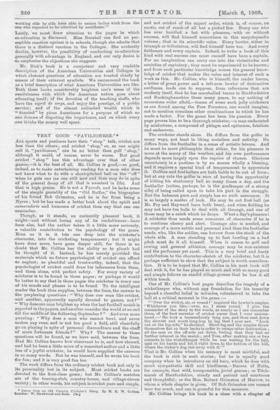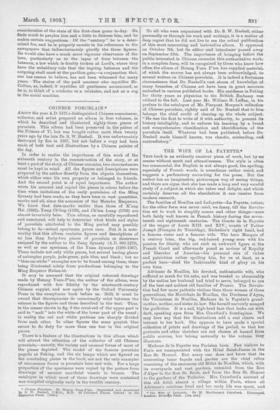VERY GOOD "PAVILIONESE."*
ALL sports and pastimes have their "shop" talk, cricket not less than the others ; and cricket "shop," or, as one might call it, "pavilionese," can be no better than golf "shop," although it could, of course, never be worse. But good -cricket " shop " hae this advantage over that of other .games,—it is the best of all, Mr. Collins is good,—so good, indeed, as to make entertaining reading for a man who does .not know what to do with a short-pitched ball on the "off " "when he gets one (as one still now and then may do in spite Of the general decay of all that is sweetest in life). And that is high praise. He is not a Pycroft, and be lacks some of the simple geniality of the "Old Buffer," the biographer 'of his friend Bob Grimston, and he is far from being a Nyren ; but he has made a better book about the spirit and ,camaraderie and humours of cricket than any that one can -remember.
Though, as it stands, an eminently pleasant book, it might—and without losing any of its readableness—have been also, had the author taken it a little more seriously, a valuable contribution to the psychology of the game. Even as it is, it lets one deep into the cricketer's -character, into the cricketing temperament ; but it might lave done more, have gone deeper still, for there is no doubt that Mr. Collins has the ability so to plumb had lie thought of it. Instead, be has merely provided the materials which no future psychologist of cricket can afford 'to neglect; so plentiful and trustworthy, indeed, that the psychologist of cricket could draw his inferences from them, 'and them alone, with perfect safety. For every variety of cricketer is to be found in those pages ; or perhaps it would "tic better to say that in these pages the cricketer in every one -of his moods and phases is to be found. To the intelligent reader the book thus supplies, between the lines, the answer to -the perplexing questions : " Why does one man like cricket, and another, apparently equally devoted to games, not P" 44 Why does one man brighten up when the last football match is reported in the papers, and another consider the world at an end dill the middle of the following September P " And even more puzzling: " Why does a man who cannot bowl, and never .makes any runs, and is not too good a field, still cheerfully -go on playing in spite of personal discomfiture and the chaff of more fortunate friends P " Why P The answer to these -questions will bo found, as we have said, between the lines. Had Mr. Collins known how observant he is, and how shrewd, and had lie been a little more of a conceited author and a little less of a joyful cricketer, he would have supplied the answers in so many words. But he was himself, and he wrote his book 4'or fun; and it is very good fun too.
The work differs from the ordinary cricket book not only in its personality but in its subject. Most cricket books are -devoted to the first-class game ; but Mr. Collins's matches are of the touring-club, country-house, and village-eleven variety; in other words, his subject is cricket pure and simple,
* Leaven from an OM Country Cricketer's Diary. By M. B. W. Collins. Condon: W. Blackwood and Sons. [dm.]
and not cricket of the expert order, which is, of course, an exotic, out of reach of all but a picked few. Every one who has ever handled a bat with pleasure, with or without success, will find himself somewhere in this encyclopaedic volume ; that is its scientific value. Every bowler, either in triumph or tribulation, will find himself here too. And every fieldsman and every captain. Indeed, to write a book of this kind with real success one must oneself have been a captain. For no imagination can carry one into the vicissitudes and anxieties of captaincy ; they must be experienced to be known; and from such particular knowledge comes the general know- ledge of cricket that makes the value and interest of such a work as this. Mr. Collins, who is himself, the reader learns, a hitter of great power and a left-arm bowler of destructive swiftness, leads one to suppose, from references that are modesty itself, that he has marshalled teams in Hertfordshire and Buckinghamshire those many years, to say nothing of excursions wider afield,—teams of some such jolly cricketers as are found among the Free Foresters, one would imagine. not to mention countless other combinations in which he has made a factor. For the game has been his passion. Every page proves him to be a thorough cricketer,—a man undaunted by misfortune, a compound of phlegm and optimism, fatalism and endeavour.
The cricketer stands alone. He differs from the golfer in many ways, not least in liking socialism and activity. He differs from the footballer in a sense of artistic leisure. And he must be more philosophic than either, for his pleasure is more at the mercy of the weather, and his own performance depends more largely upon the caprice of chance. Glorious uncertainty in a pastime is by no means wholly a blessing, and it requires a special kind of temperament to appreciate it. Golfers and footballers are both liable to be out of form ; but at any rate the golfer is sure of having the opportunity of hitting his stationary ball so many times a day, and the footballer (unless, perhaps, lie is the goalkeeper of a strong side) of being called upon to take his part in the struggle. But the batsman pure and simple has no such assurance. It is so largely a matter of luck. He may be out first ball (as Mr. Fry and Hayward have both been), and when fielding he may not have ten balls to deal with all through, and one of those may be a catch which he drops. What a day's pleasure ! A cricketer thus needs some resources of character if he is to continue cheery and alert. Courage also is needed, and courage of a more subtle and personal kind than the footballer needs, who, like the soldier, can borrow from the stock of the whole side. A man standing up to fast bowling on a bad pitch must do it all himself. When it comes to golf and rowing and general athletics, courage may be non-existent and the performer yet excel. This is a very brief and hasty contribution to the character-sketch of the cricketer, but it is perhaps sufficient to show that the subject is worth considera- tion. It is to be hoped that Mr. Collins in his next book will deal with it, for he has played so much and with so many good and simple fellows on candid village-greens that he has it all within touch, One of Mr. Collins's best pages describes the tragedy of a wicketkeeper who, without any foundation for his temerity beyond a cheerful belief in miracles, volunteered to take the ball at a critical moment in the game :-
"' Over the wicket, sir, or round P' inquired the bowler's umpire. Whichever you like,—over, no, I mean round.' I give the remainder of the story in the words, as nearly as I can remember them, of the best narrator of cricket yarns that I over encoun- tered :—' He took a tremendously long run, and then sent down the slowest and worst long-hop to leg that I over saw. "Look out on the log-side," lie shouted. Short-log and the umpire threw themselves flat on their backs in order to escape utter destruction ; all the men on the off-side sat down, fooling that they had no further interest in the match ; and Toni, after making one or two remarks to the wicketkeeper while he was waiting for the ball, spat on his hands and hit it right down to the bottom of the hill, whore the tinker's dog ran away with it.'"
That is Mr. Collins when his memory is most mirthful, and the book is rich in such stories ; but he is equally good company when he introduces an old hero, which ho does with much sympathetic skill and kindliness,—Barnes of Notts, for example, that wild, irresponsible, jovial genius; or Titch- marsh of Hertfordshire, steady and patient and courteous and thoughtful; or the Hon. Robert Grimston of Harrow, to whom a whole chapter is given. Of Bob Grimston one cannot hear too much, and one is grateful for this measure.
Mr. Collins brings his book to a close with a chapter of
consideration of the state of the first-class game to-day. He finds much to perplex him and a little to distress him, and he makes certain suggestions. Of the "century" he is a deter- mined foe, and he is properly caustic in his references to the newspapers that indiscriminately glorify the three figures. Re would also have a much more rigorous observance of the laws, particularly as to the lapse of time between the batsmen, a law which is doubly broken at Lord's, where they have the subsidiary rule that the ingoing batsman and the outgoing shall meet at the pavilion gate,—a conjunction that, one has reason to believe, has not been witnessed for many years. The status of the paid amateur also mystifies Mr. Collins, as, indeed, it mystifies all gentlemen accustomed, as he is, to think of a cricketer as a cricketer, and not as a cog in the social machine.















































 Previous page
Previous page